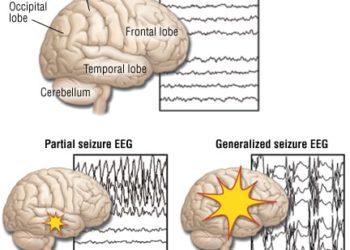New prognostication tool predicts neurological deficits and long-term survival in patients with status epilepticus
1. In this retrospective cohort study, among 261 patients with status epilepticus, age, duration, and nonconvlusive status epilepticus in coma were associated with developing new neurological deficits.
2. This study’s novel prognostication tool, the ACD scoring system, demonstrated reliability in predicting long-term survival outcomes for patients with status epilepticus after accounting for risk factors for new neurological deficits.
Evidence Rating Level: 2 (Good)
Study Rundown: Neurological deficits are a known complication of status epilepticus, however there is limited evidence surrounding risk factors associated with long-term outcomes including mortality. The extent to which neurological deficits contributes to patient outcomes is poorly understood. This retrospective cohort study aimed to create and validate a prognostication tool to estimate long-term mortality of individuals with status epilepticus. Their tool, the ACD scoring system, represents age at onset, level of consciousness at admission and duration, and was developed to predict 2-year (long-term) mortality after hospital discharge for patients with status epilepticus. The main outcomes included 2-year survival for all patients with status epilepticus, neurological deficits before and after onset, demographic characteristics, etiological categories of status epilepticus, comorbidities, survival, treatments and prognostic scores. In total, 261 patients with status epilepticus were included with a mean age of 67.2 years, of whom 145 patients had the condition from causes that were either not, or less damaging to the brain. Factors including age, long duration, and nonconvulsive type status epilepticus in coma were associated with development of new neurological deficits. New neurological deficits were a predictor of 2-year survival after hospital discharge and were associated with a 5-fold increase in the odds of death at 2-years post-diagnosis. The ACD score was a valuable way to estimate survival after diagnosis and demonstrated a linear correlation with 2-year survival after combining duration and nonconvulsive type with age at onset of status epilepticus. A major strength of this study is that all survival data were complete due to linkage between patients’ medical records and the national registries. A limitation however is the potential for selection bias due the retrospective study design.
Click to read the study in JAMA Neurology
Relevant Reading: High long-term mortality after incident status epilepticus in adults: Results from a population-based study
In-Depth [retrospective cohort]: This retrospective cohort study aimed to create and validate a prognostication tool to estimate long-term mortality of individuals with status epilepticus, and to investigate factors associated with long-term survival. A total of 261 patients (mean [SD] age, 67.2 [14.8] years; 132 women [50.6%]) with a status epilepticus diagnosis in Denmark were included, of whom 145 patients (mean [SD] age, 66.3 [15.0] years; 78 women [53.8%]) had status epileptics causes that were either not, or less damaging to the brain. The primary exposure was long-term follow-up using national and local civil registry data in Denmark, Norway and Germany. The predefined end point was 2-year survival for all patients. New neurological deficits were a significant predictor of 2-year survival after hospital discharge (OR, 5.1; 95% CI, 2.2-11.8). Among patients who were alive at discharge, 29.8% had developed moderate to severe neurological deficits. The mean follow-up duration was 2.2 years. From baseline to first follow-up for the cohort, factors including age of onset (adjusted P value = .09), duration of status epilepticus (adjusted P value = .002), and non-convulsive status epilepticus in coma (adjusted P value = .22), were associated with the development of new neurological deficits. For all patients, mortality increased nearly 3-fold from the short-term in hospital rate of 17.6% to the long-term (after 2 years) rate of 47.1%. The estimated median survival for patients with an NIHSS score increase of less than 5 points was 85.2% (95% CI, 30.0-107.2) months compared with 34.2 (95% CI, 8.1-60.3) months in patients with an NIHSS score increase between 5 and 10 points, and 3.4 (95% CI, 2.3-4.5) months in patients with an NIHSS score greater than 10 points. In the cumulative cohort from Denmark, Germany and Norway, the ACD score was found to have a correlation with survival, and an ACD score higher than 10 points was associated with mortality. Mortality at 2 years after discharge showed an almost linear correlation with the ACD score (Pearson r2=0.848). As such, the ACD score has been demonstrated to be a valuable tool to estimate long-term survival after a status epilepticus diagnosis.
Image: PD
©2022 2 Minute Medicine, Inc. All rights reserved. No works may be reproduced without expressed written consent from 2 Minute Medicine, Inc. Inquire about licensing here. No article should be construed as medical advice and is not intended as such by the authors or by 2 Minute Medicine, Inc.







